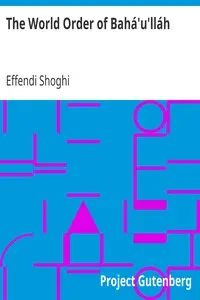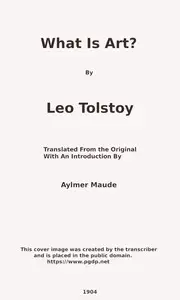"The World Order of Bahá'u'lláh" by Shoghi Effendi is a profound exploration of the Bahá'í Faith's vision for a unified world. This text introduces readers to the core beliefs and administrative structures designed to foster global unity and transcend societal divisions. Beginning with a letter addressing concerns within the Bahá'í community, Effendi underscores the divine origin and essential role of Bahá'í institutions in upholding the Faith's principles. He reframes challenges as opportunities for growth, guiding the reader toward a deeper understanding of the administrative framework as a means to achieve spiritual and social cohesion. This opening sets the stage for a comprehensive examination of the principles and purposes of Bahá'í institutions, clarifying the Faith’s commitment to establishing a new world order rooted in spiritual unity.

The World Order of Bahá'u'lláh
By Effendi Shoghi
Discover how a faith-based administrative structure aims to unite humanity and establish a new world order.
Summary
About the AuthorShoghí Effendi (; Persian: شوقی افندی; 1 March 1897 – 4 November 1957) was an Ottoman-born Iranian religious figure and the Guardian of the Baháʼí Faith from 1921 to 1957. As the grandson and successor of ʻAbdu'l-Bahá, he was responsible for creating a series of teaching plans that oversaw the expansion of the Baháʼí Faith to a number of new countries, and also translated many of the written works of crucial Baháʼí leaders. Upon his death in 1957, the Hands of the Cause, which included his Canadian wife Rúhíyyih Khánum, took on the role of overseeing the transfer of the religion's supreme legal authority to the Universal House of Justice, which has held elections every five years since 1963.
Shoghí Effendi (; Persian: شوقی افندی; 1 March 1897 – 4 November 1957) was an Ottoman-born Iranian religious figure and the Guardian of the Baháʼí Faith from 1921 to 1957. As the grandson and successor of ʻAbdu'l-Bahá, he was responsible for creating a series of teaching plans that oversaw the expansion of the Baháʼí Faith to a number of new countries, and also translated many of the written works of crucial Baháʼí leaders. Upon his death in 1957, the Hands of the Cause, which included his Canadian wife Rúhíyyih Khánum, took on the role of overseeing the transfer of the religion's supreme legal authority to the Universal House of Justice, which has held elections every five years since 1963.

















